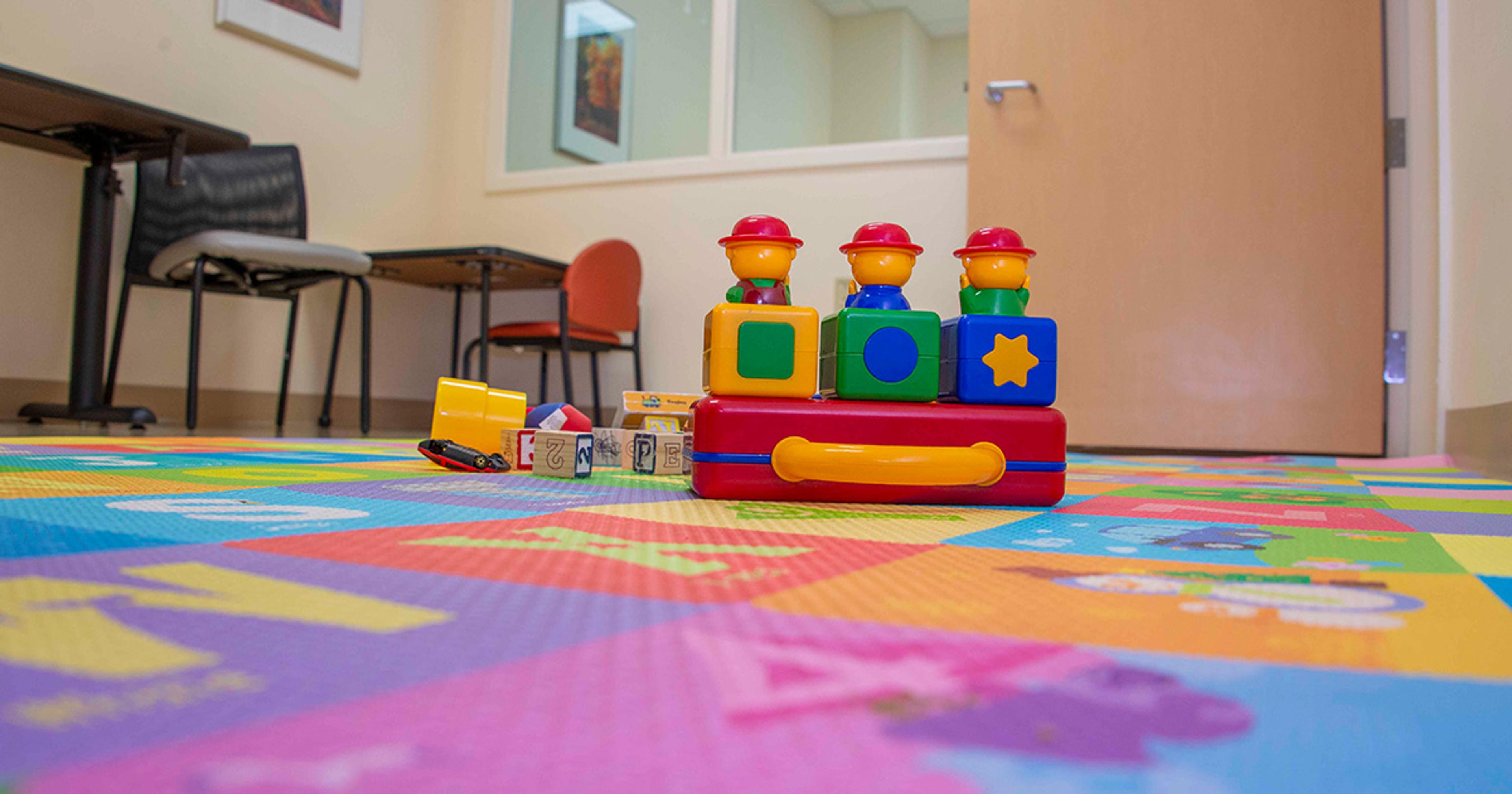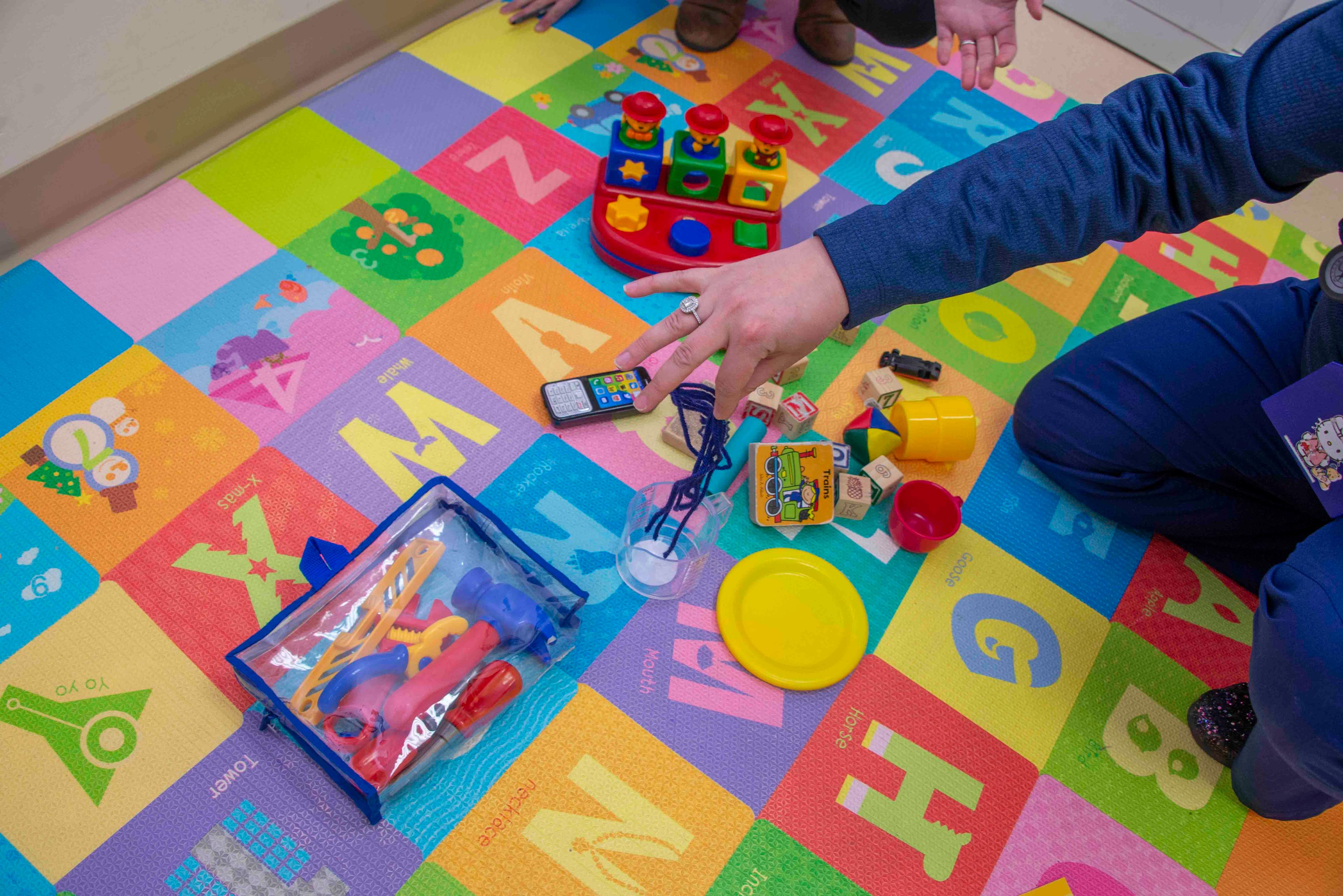PEARS Increases Early Autism Identification in Toddlers with Play-Based, Rapid Interactive Screening System

Jake Newby
| 5 min read
Jake Newby is a brand journalist for Blue Cross Blue Shield of Michigan.

Autism spectrum disorder (ASD) can reliably be identified in children starting at 14 months of age, but the average age of diagnosis in the United States is 4 years and 4 months, and even later among children of color. Early diagnosis and intervention lead to significantly improved outcomes at home, school and in social settings, so it’s crucial to identify the disorder as early as possible.
Eager to help lower the average age of diagnosis, the University of Michigan Department of Pediatrics launched the two-phased Pediatric Early Autism Recognition System (PEARS) clinical trial in 2022. The second phase of the innovative pilot was funded by the Blue Cross Blue Shield of Michigan (BCBSM) Foundation’s Physician Investigator Research Award Program grant, awarded to the university in 2021.
“We really wanted to think about how we could improve our process of early identification of children with autism, with a goal of hopefully getting them into services sooner,” said Dr. Nicole Hamp, a developmental behavioral pediatric fellow with the University of Michigan/Mott’s Children Hospital. “Because we know that early intervention is tied to better skill attainment and outcomes.”
What is PEARS?
PEARS’ primary goal was to assess a new autism evaluation model that would include the addition of a Level-2 autism screener, known as the Rapid Interactive Screening Test for Autism in Toddlers (RITA-T), in hopes of increasing clarity of autism risk and parent awareness of symptoms, compared to standard Level-1 screening practices, which revolve almost exclusively around yes or no questions. RITA-T assessments over the course of the clinical trial were conducted from families’ primary medical homes.
Knowing that wait times for specialized autism evaluations can be long, PEARS set out to schedule assessments in under three weeks, instead of the common 6- to 12-month waitlist, so families could have their children evaluated, receive results as soon as possible. PEARS screenings are designed to be unintimidating, without any physical exam, stethoscope or white coat. Play-based PEARS assessments are filled with toys and pictures, with no white coats or extensive medical equipment to be found.
Making PEARS ‘the standard of care’ moving forward
“Supporting the health of children in Michigan is a top priority for the Foundation, especially when it comes to children with developmental disabilities,” said Myra Tetteh, senior program officer for the BCBSM Foundation. “It’s an honor for us to assist in forward-thinking programs like PEARS that help families of children with autism get early connections to the proper services and treatment they need, so they can resume a happy, healthy life together.” Learn more about the Physician Investigator Research Award Program – including eligibility and how to apply – at this link.

The $9,100 BCBSM Foundation’s grant was “essential” in helping PEARS make a true clinical impact in its pilot stage, according to Hamp.
“I think the fact that Blue Cross was interested in helping us improve systems of care for what I feel is a traditionally marginalized and forgotten community, I think is really impactful,” she said. “There’s been a lot of new attention to diversity, equity and inclusion across sectors, and I think one of the groups of people that gets forgotten and left behind is individuals with disabilities, and certainly neuro diverse individuals and individuals with ASD. I don’t want to say that it’s impossible to find places that are interested in funding this kind of research, but it seems harder. And so, the fact that BCBSM was motivated to help us do this was really meaningful to me.”
The hope now, Hamp said, is that this pilot changes how care is delivered to children with autism at U of M in the future.
After the findings, the RITA-T is a triage tool for the autism assessments in the Blue Cross Blue Shield of Michigan Approved Autism Evaluation Center within the Developmental Behavioral Pediatrics clinic at University of Michigan C.S. Mott Children’s Hospital.
“I think this is something that we’ve proven is feasible to do and adds a lot of value to the care that we provide families,” Hamp added. “My hope is that we would get a PEARS PCP in every one of our primary care clinics and this would be the standard of care for children that are suspect of having autism. And then our waitlists as a result start to dwindle, and that we get children in for subspecialty evaluations across the university sooner.”
Feedback from parents
Hamp said the study proved the PEARS model to be highly feasible – both from a provider and family perspective. Multiple parents attested to the intuitive, informative nature of the process.
“One parent said, ‘I think the RITA-T helped me to understand the variations between typical development and where my child is currently,’” “Another parent said, ‘I think that seeing the type of evaluation that was being done and the activities being done gave me more insight into ways my son might be different than other children.’”
“I think it has helped because it allowed me to get some answers right now, and be able to know that, ‘Yeah this is something I should pursue,’ as opposed to just being on a waitlist,” said another parent. “It kind of made me feel like I was ahead of the game, and now I can make a plan.”
Photo credit: Nicole Hamp/PEARS
Here's how other BCBSM Foundation grant recipients bolstered their programs:
- Blue Water Area YMCA Promoting Physical Fitness, Decreasing Social Isolation Among Older Adults in Michigan’s Thumb
- Covenant House Michigan Supports At-Risk Youth in Detroit Through House of Hope Program
- Southeast Michigan Organizations Providing Medication-Assisted Treatment, Reentry Services to At-Risk Individuals





